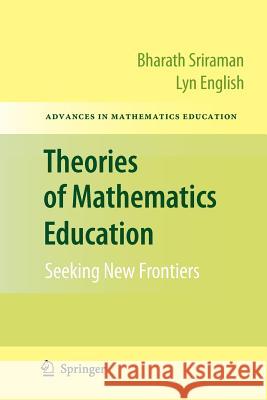Theories of Mathematics Education: Seeking New Frontiers » książka
Theories of Mathematics Education: Seeking New Frontiers
ISBN-13: 9783642261183 / Angielski / Miękka / 2012 / 668 str.
Theories of Mathematics Education: Seeking New Frontiers
ISBN-13: 9783642261183 / Angielski / Miękka / 2012 / 668 str.
(netto: 383,36 VAT: 5%)
Najniższa cena z 30 dni: 385,52
ok. 22 dni roboczych.
Darmowa dostawa!
Advances in Mathematics Education is a new and innovative book series published by Springer that builds on the success and the rich history of ZDM--The Inter- tional Journal on Mathematics Education (formerly known as Zentralblatt fur - daktik der Mathematik). One characteristic of ZDM since its inception in 1969 has been the publication of themed issues that aim to bring the state-of-the-art on c- tral sub-domains within mathematics education. The published issues include a rich variety of topics and contributions that continue to be of relevance today. The newly established monograph series aims to integrate, synthesize and extend papers from previously published themed issues of importance today, by orienting these issues towards the future state of the art. The main idea is to move the ?eld forward with a book series that looks to the future by building on the past by carefully choosing viable ideas that can fruitfully mutate and inspire the next generations. Taking ins- ration from Henri Poincare (1854-1912), who said "To create consists precisely in not making useless combinations and in making those which are useful and which are only a small minority.
This inaugural book in the new series Advances in Mathematics Education is the most up to date, comprehensive and avant garde treatment of Theories of Mathematics Education which use two highly acclaimed ZDM special issues on theories of mathematics education (issue 6/2005 and issue 1/2006), as a point of departure. Historically grounded in the Theories of Mathematics Education (TME group) revived by the book editors at the 29th Annual PME meeting in Melbourne and using the unique style of preface-chapter-commentary, this volume consist of contributions from leading thinkers in mathematics education who have worked on theory building.§This book is as much summative and synthetic as well as forward-looking by highlighting theories from psychology, philosophy and social sciences that continue to influence theory building. In addition a significant portion of the book includes newer developments in areas within mathematics education such as complexity theory, neurosciences, modeling, critical theory, feminist theory, social justice theory and networking theories. The 19 parts, 17 prefaces and 23 commentaries synergize the efforts of over 50 contributing authors scattered across the globe that are active in the ongoing work on theory development in mathematics education.











